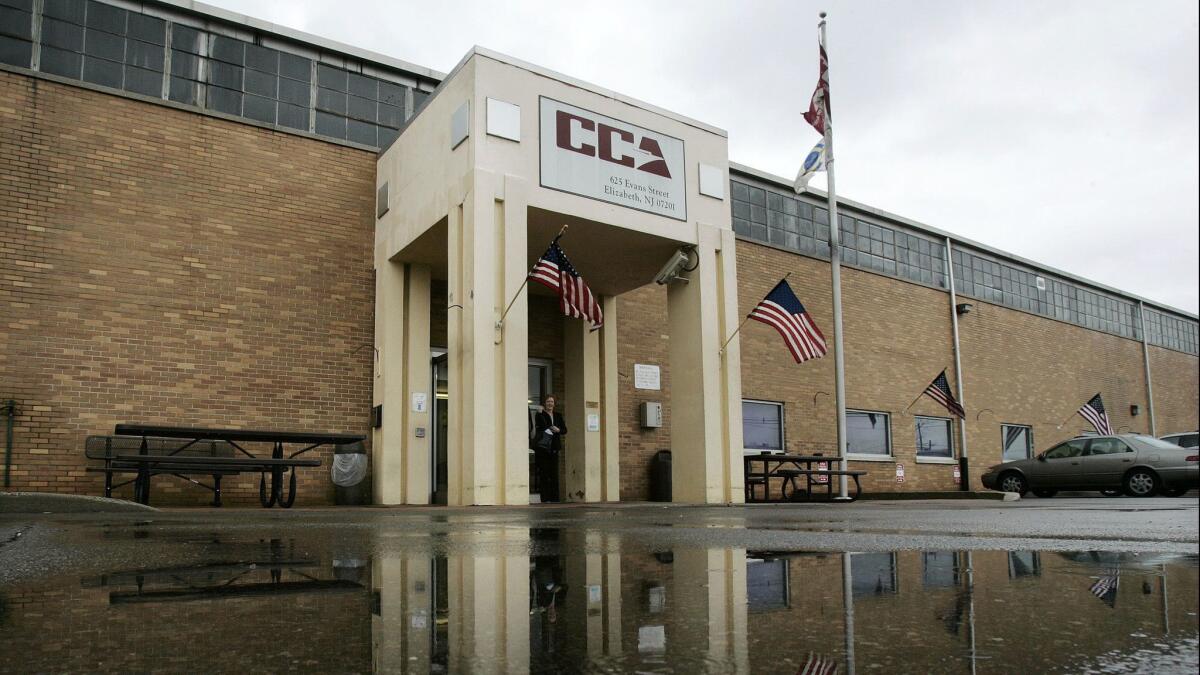Editorial: California’s public-employee pensions don’t have the luxury of making political statements

The Trump administration’s practice of separating young children from their asylum-seeking parents and detaining them in prison-like facilities was abhorrent and so inhumane that even the administration chose not to defend it to an outraged public.
The ongoing detention of families is less barbaric, though still bad policy. But it is good business for the private corrections companies that contract with the government to house detainees. And it may get even more lucrative. According to the Wall Street Journal, the Trump administration has requested $2.8 billion in the coming fiscal year to pay for 12,000 more beds in immigration detention centers.
Among the investors that may profit from the demand for detention centers is the California State Teachers’ Retirement System, which has $12 million in investments in two private correction companies, CoreCivic of Nashville, Tenn., and GEO Group of Boca Raton, Fla. But hundreds of teachers and activist groups are now demanding the CalSTRS board divest from these companies because they say it is immoral to make money from human misery.
“We are here to serve diverse communities not profit from them,” one teacher said during an emotional moment at a CalSTRS investment committee meeting on Friday.
We agree that it’s repugnant that misery can be monetized, and we have issues with the government outsourcing of corrections in general. But let’s be clear: The villain in this dark moment in U.S. history is the federal government — and in particular, the Trump administration — not private prison companies.
As Gov. Jerry Brown points out year after year, the good times never roll on forever.
The California Teachers Assn., the state’s largest teachers union, has taken a more measured approach, raising concerns about the conditions in the private facilities and asking the manager of CalSTRS’ pension fund to investigate whether the investments continue to meet the fund’s guidelines on human rights. But even this inquiry seems to be politically motivated, considering the time required to police an investment that’s a tiny sliver of the fund’s $224 billion in assets.
We are concerned about the increasing pressure to politicize the state’s largest public employee retirement funds, and think teachers ought to be as well. CalSTRS is deeply underfunded (even more than the California Public Employees’ Retirement System) with a staggering $107 billion in unfunded liabilities that threaten not just the school districts that will be squeezed to make up for the shortfall, but also the state’s taxpayers, who would have to pay any pensions CalSTRS couldn’t finance.
The calls for divestment used to be rare, focusing on truly toxic substances, such as tobacco, or countries targeted for global sanctions, such as South Africa during the apartheid era. But in recent years, activists have used divestment as a way to turn their political agendas into action.
Last year the state Legislature considered a bill pushing CalSTRS and CalPERS to divest from the companies that financed the Dakota Access Pipeline. This year, state Treasurer John Chiang urged both retirement funds to divest from assault rifle companies. CalPERS resisted, but CalSTRS agreed to put pressure on gun retailers.
Enter the Fray: First takes on the news of the minute from L.A. Times Opinion »
Both funds prefer to use their holdings as leverage, engaging with companies to try to change policies they find problematic before they take the drastic step of divesting, which can take as years to fully accomplish and can reduce investment returns. CalPERS divested from tobacco companies in 2000, and although it was the moral and sensible thing to do, it cost the fund an estimated $3.68 billion in earnings.
Sacrificing some future revenue might seem like no big deal at the moment, with better-than-expected returns coming in. CalPERS reported an 8.6% rate of return for the fiscal year that ended June 30. CalSTRS did even better, reporting a 9% return for the same period, and for the second year in a row beating its own 7% expectations.
But as Gov. Jerry Brown points out year after year, the good times never roll on forever. And with such enormous unfunded liabilities, CalSTRS (and CalPERS) already need an exceptionally long run of better-than-expected earnings. The dark clouds seem to be gathering on the horizon already, seeded perhaps by the president’s trade war with the rest of the globe, which CalSTRS’ chief investment officer warned could hurt returns in the future. This is no time to force CalSTRS to use its pension funds to make a political statement, especially one directed at the wrong target.
Follow the Opinion section on Twitter @latimesopinion and Facebook
More to Read
A cure for the common opinion
Get thought-provoking perspectives with our weekly newsletter.
You may occasionally receive promotional content from the Los Angeles Times.










